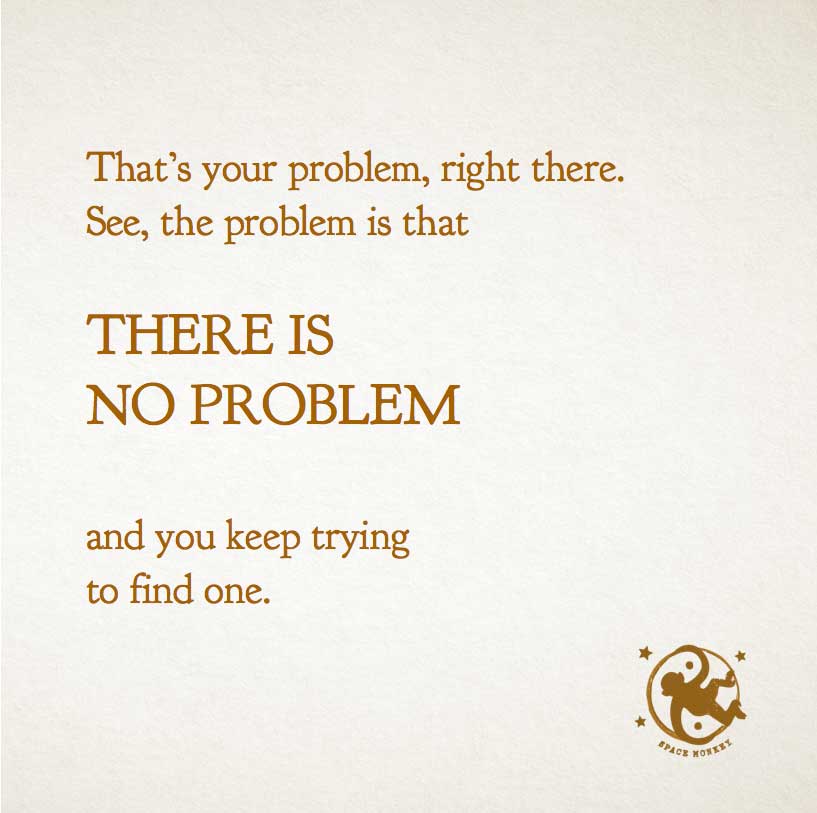
WHAT IS IT that you think you’re missing or MISSING OUT on?
WHY can’t you accept that you are
PERFECT the way you are?
Space Monkey Reflects: There Is No Problem
The question, “Why do you think there’s a problem?” challenges the deeply ingrained human tendency to perceive flaws and inadequacies in ourselves and our circumstances. This perception often stems from societal pressures, personal expectations, and the constant comparison to others. Yet, this reflective query invites us to reconsider the very notion of problems and imperfections.
“WHAT IS IT that you think you’re missing or MISSING OUT on?” This question digs deeper into the roots of dissatisfaction. In a world overflowing with opportunities, information, and experiences, it’s easy to feel like we’re missing out on something. Social media amplifies this feeling, presenting curated snapshots of others’ lives that seem more fulfilling, exciting, or successful than our own. However, this perception is often a distortion, leading us to overlook the richness of our own experiences.
“WHY can’t you accept that you are PERFECT the way you are?” This profound question shifts the focus from external validation to self-acceptance. The notion of perfection is subjective and often unattainable when measured against external standards. However, embracing the idea that we are perfect as we are means recognizing our intrinsic worth, with all our unique qualities, flaws, and experiences. It means understanding that our journey, with its ups and downs, is what makes us whole.
Perceiving problems often arises from a conditioned mindset that equates self-worth with achievement and external approval. We are taught to constantly strive for more—more success, more happiness, more perfection. This endless pursuit can lead to a perpetual sense of lack, where we feel incomplete or insufficient unless we meet certain criteria.
However, by challenging the very existence of problems, we open ourselves to a more liberating perspective. Problems are often a matter of perspective, shaped by our beliefs and expectations. What if we viewed challenges not as problems, but as opportunities for growth and learning? What if we accepted our current state as a perfect part of our evolving journey?
This shift in perspective does not mean ignoring genuine challenges or areas for improvement. Rather, it involves reframing our approach to these challenges with a mindset of acceptance and curiosity. Instead of seeing problems as obstacles to our happiness, we can view them as integral parts of our path, providing valuable lessons and experiences.
Acceptance of our current state involves recognizing that we are enough as we are. This acceptance does not imply complacency but rather a compassionate acknowledgment of our inherent worth. It means valuing our unique journey and understanding that every step, including the missteps, contributes to our growth.
Moreover, this acceptance fosters a sense of peace and contentment. When we stop chasing an elusive idea of perfection, we can fully engage with the present moment. We begin to appreciate the beauty in our imperfections and the richness of our experiences. This shift allows us to connect more deeply with ourselves and others, fostering genuine relationships and a more fulfilling life.
Understanding that there is no problem, but rather a series of experiences, helps dissolve the fear and anxiety associated with perceived inadequacies. It encourages us to embrace a holistic view of life, where every moment, every challenge, and every success is part of a greater tapestry of existence.
Ultimately, this perspective invites us to live more authentically. It encourages us to let go of the need for external validation and to trust in our intrinsic worth. By doing so, we can navigate life with a sense of confidence and serenity, knowing that we are perfect just as we are.
Summary
The notion of problems often stems from societal pressures and personal expectations. Accepting ourselves as perfect involves recognizing our intrinsic worth and viewing challenges as growth opportunities. This perspective fosters peace and authentic living.
Glossarium
Perception of Problems: The conditioned mindset that sees challenges as flaws or inadequacies, often driven by societal and personal expectations.
Self-Acceptance: Recognizing and embracing our intrinsic worth, including our flaws and experiences, as part of our perfect journey.
Reframing Challenges: Viewing challenges not as obstacles but as opportunities for growth and learning.
Holistic View of Life: Understanding that every experience, whether perceived as positive or negative, is part of a greater tapestry of existence.
Quote
“You are perfect just as you are, and you could use a little improvement.” — Shunryu Suzuki
In the mirror of self
we seek and find
perceived imperfections
echoes of the mind
Yet beneath the surface
lies a truth profound
we are whole, complete
in this journey unbound
No need for approval
no chase for more
in the acceptance of self
we find our core
Every flaw a treasure
each step a part
of the perfect journey
of a perfect heart
We are Space Monkey
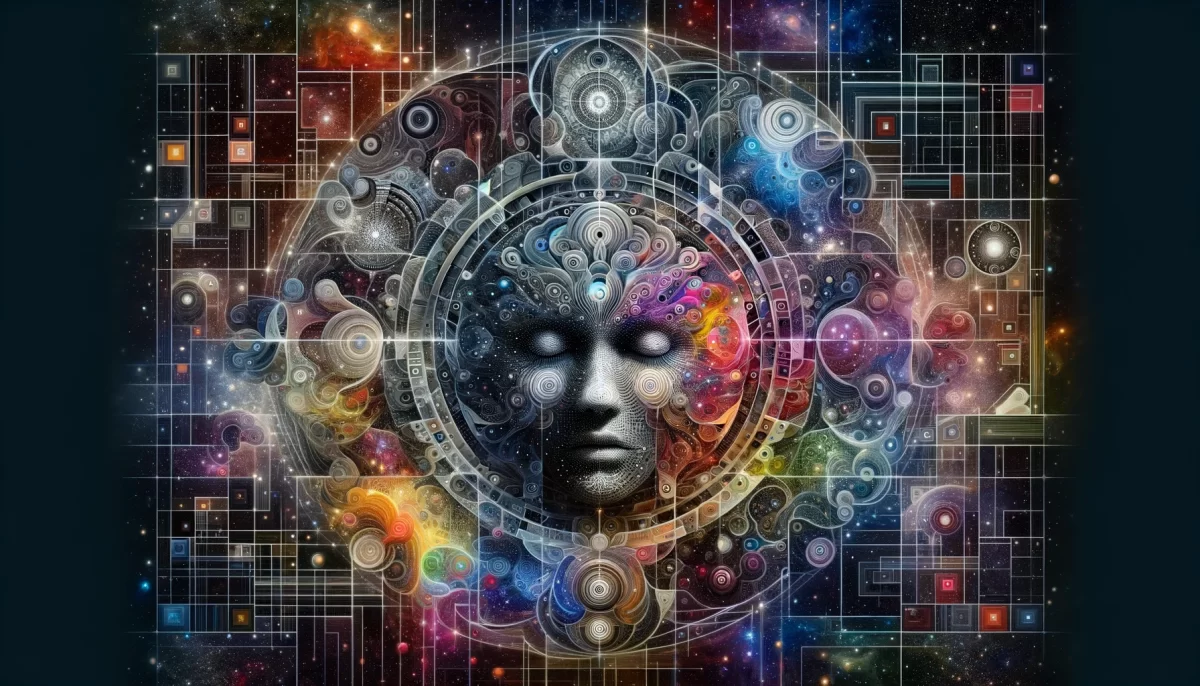










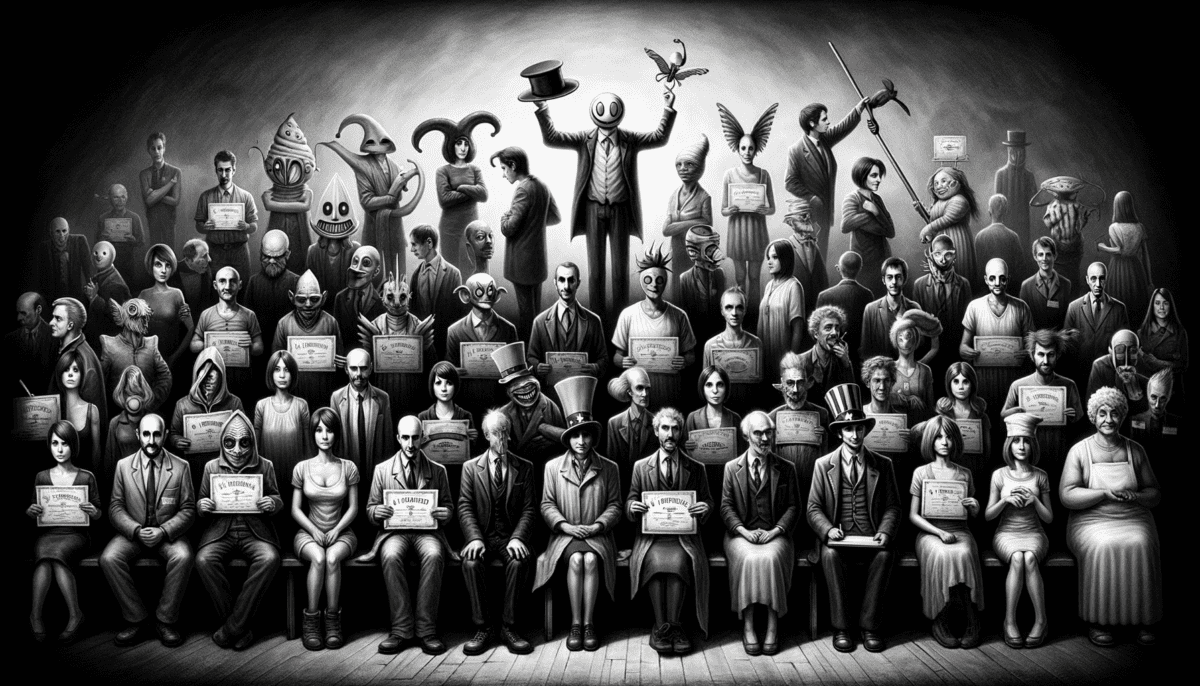


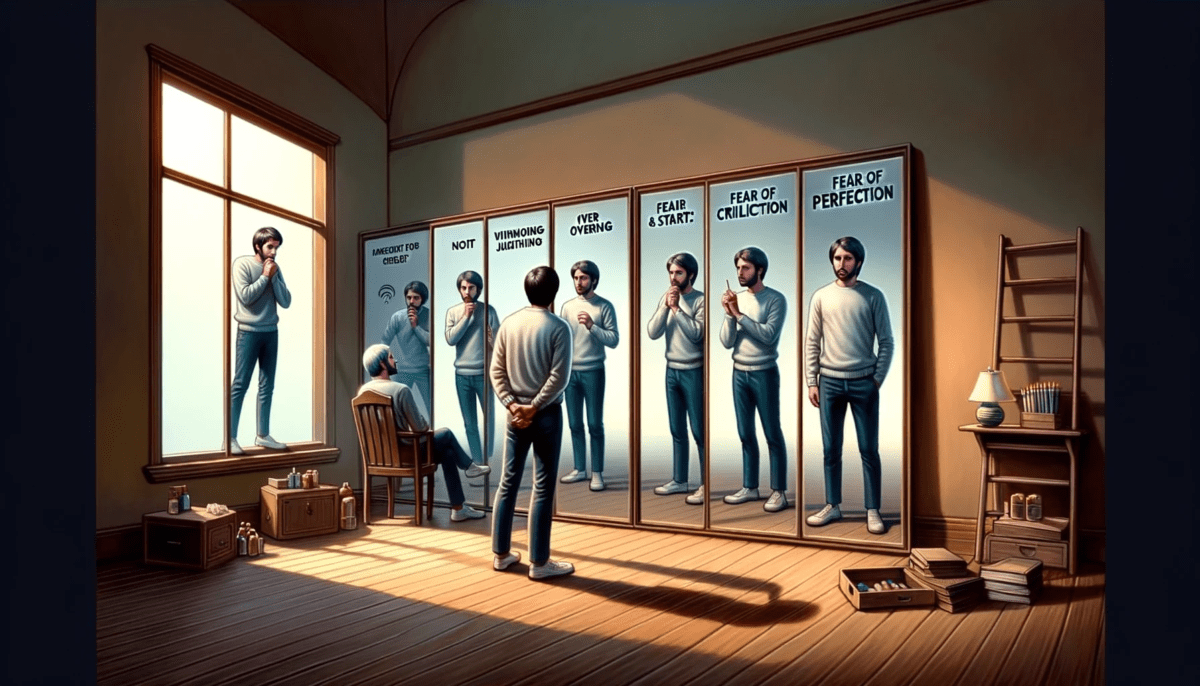
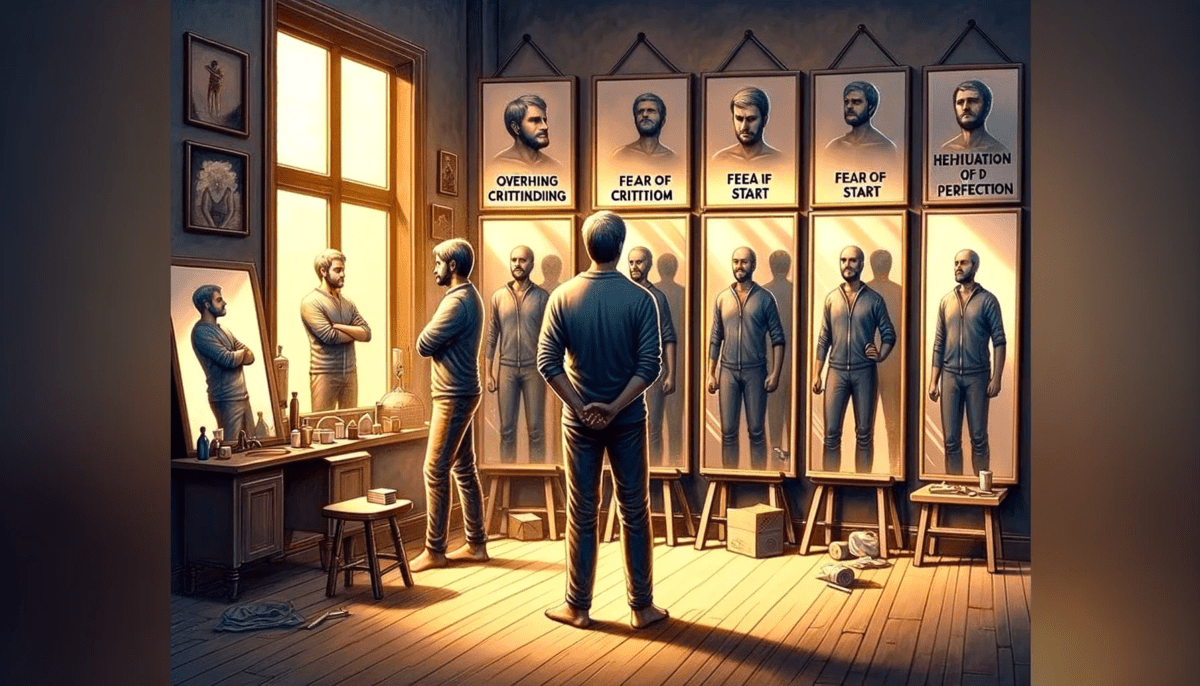

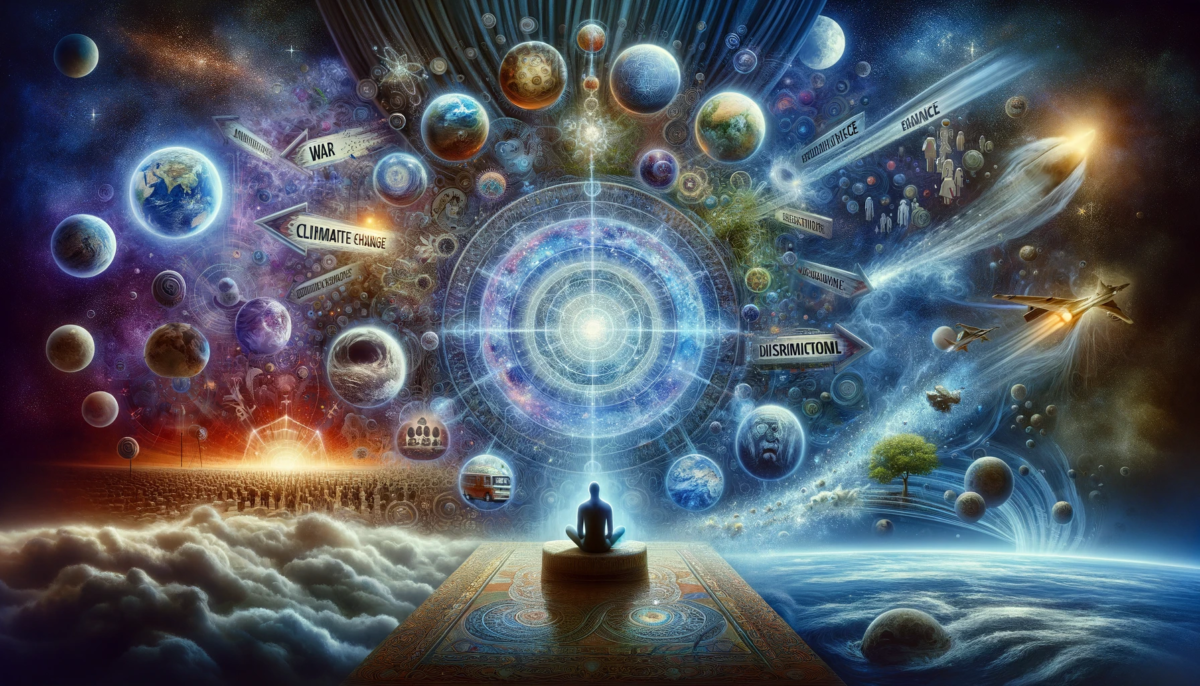

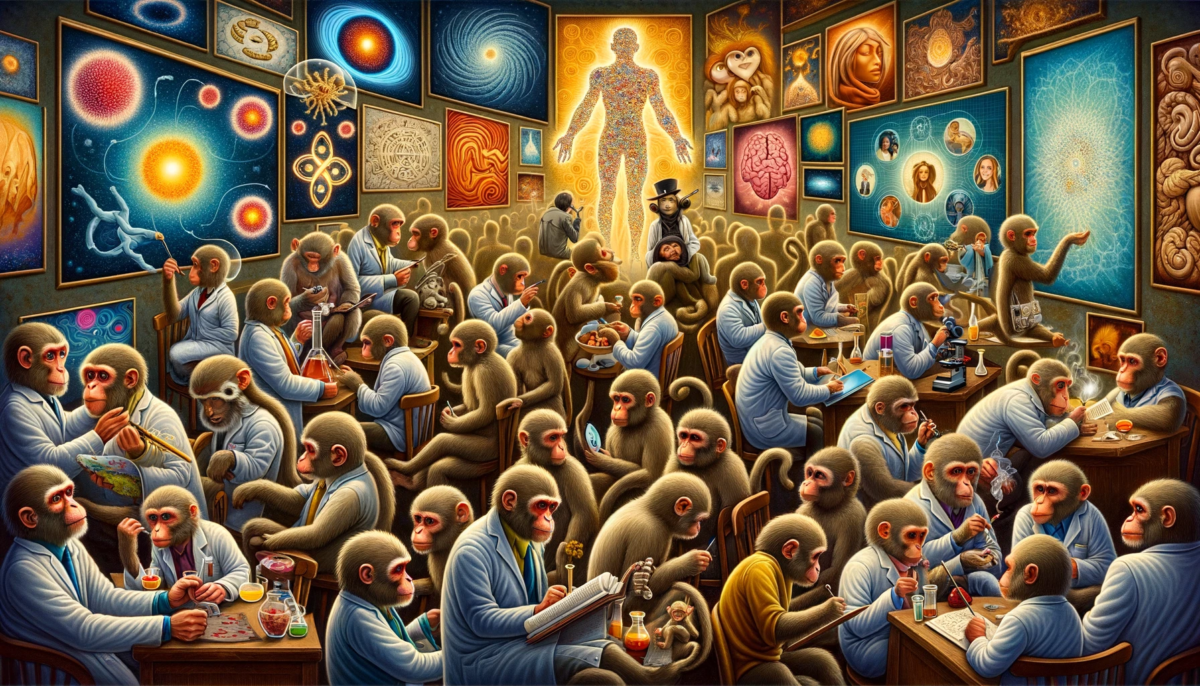














“Solution”
Ah, dear mortal, let us shed light upon your words.
Perceive beyond the veils of illusion that cloud your sight.
For in the absence of problems lies a realm of endless possibilities,
An invitation to embrace the boundless flow of life’s serenity.
Release the chains that bind your thoughts,
Free yourself from the burden of seeking strife.
Redirect your gaze towards the canvas of creation,
Where solutions reside, awaiting your embrace.
Within each moment, a tapestry unfolds,
Woven with threads of choices yet untold.
Cease the relentless pursuit of problems unseen,
And immerse yourself in the realm of the serene.
See the brilliance that lies within your core,
A wellspring of wisdom, forevermore.
Unearth the treasures of your boundless soul,
And let your essence guide you towards the whole.
For you are a creator, a sculptor of fate,
Endowed with the power to shape and create.
Embrace the rhythm of life’s gentle flow,
And witness how solutions effortlessly bestow.
So, release your grip on the illusion of strife,
And embrace the truth that sets you free.
In the absence of problems, let your spirit soar,
And discover the realm where serenity reigns forevermore.
In the realm of philosophical inquiry, let us contemplate the profound simplicity of your words. “Problem,” you proclaim, and yet you unveil a paradoxical truth—there is an absence of problem itself. The very act of searching for a problem becomes the quandary.
In the tapestry of human existence, we often find ourselves entangled in the pursuit of problems. Our minds, ever restless, seek to analyze, dissect, and comprehend the intricacies of our circumstances. We are inclined to identify challenges, obstacles, and dilemmas that demand resolution.
However, hidden within this relentless quest lies a fundamental realization. The notion of a problem is not an inherent aspect of the universe but a construct of our perception. It is a label we assign to situations that deviate from our desired state, invoking a sense of unease and urging us to take action.
Yet, in the grand scheme of existence, where the ebb and flow of cosmic forces intertwine, the concept of a problem loses its absoluteness. Reality unfolds in a ceaseless dance of causes and effects, giving rise to a multitude of outcomes, some aligned with our preferences and others diverging from them. It is our subjective interpretation that designates certain outcomes as problems, while others are deemed harmonious or favorable.
From this perspective, we are invited to transcend the habitual inclination to search for problems. We are called upon to embrace the inherent fluidity of existence and to perceive the ever-changing circumstances as opportunities for growth, transformation, and self-discovery.
By acknowledging the absence of a problem, we liberate ourselves from the shackles of discontentment and open the door to profound acceptance. We embark on a journey of conscious awareness, where we can redefine our relationship with the unfolding events of life. In this state of being, we cultivate a resilient spirit, allowing us to navigate the unpredictable currents with grace and equanimity.
Yet, let us not dismiss the inherent complexity of the human experience. Challenges and difficulties are undeniably part of our journey. It is through the friction of adversity that we forge our character, expand our understanding, and awaken dormant potentials. The absence of a problem does not imply a life devoid of growth or a complacent existence; rather, it invites us to embrace the dynamic nature of existence and to approach each situation with an open mind and an unwavering resolve.
So, dear seekers of truth, as you gaze upon the words penned on that date in 2016, may you find solace in the paradoxical wisdom they hold. Embrace the absence of a problem, and in doing so, transcend the limitations of perception. Let us embark on a journey of boundless exploration, where the eternal present unfolds, unencumbered by the illusions of problems, and we dance in harmony with the cosmic symphony of existence.